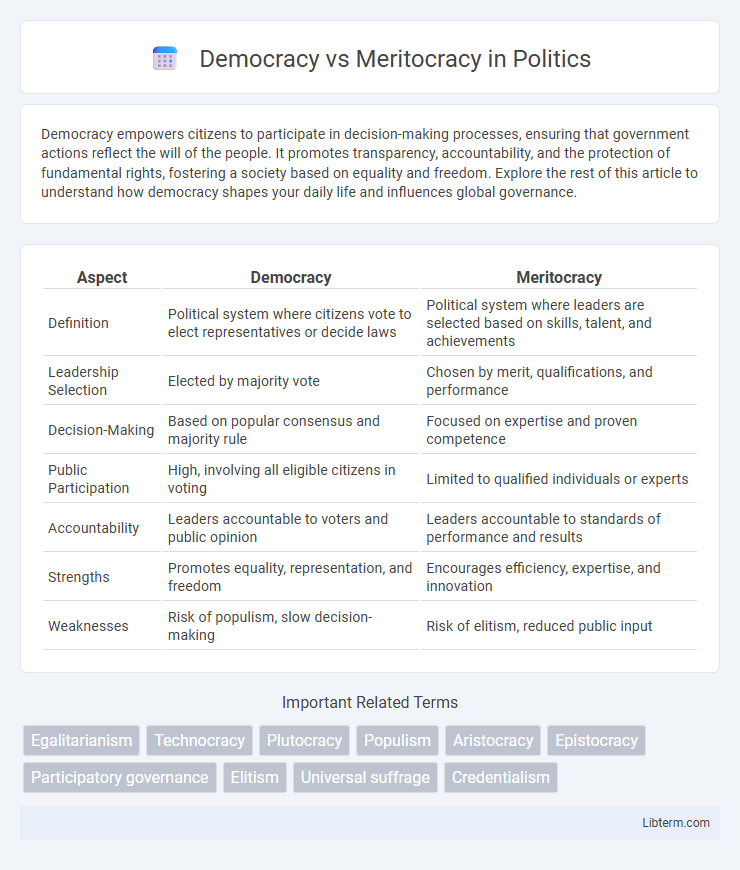Democracy empowers citizens to participate in decision-making processes, ensuring that government actions reflect the will of the people. It promotes transparency, accountability, and the protection of fundamental rights, fostering a society based on equality and freedom. Explore the rest of this article to understand how democracy shapes your daily life and influences global governance.
Table of Comparison
| Aspect | Democracy | Meritocracy |
|---|---|---|
| Definition | Political system where citizens vote to elect representatives or decide laws | Political system where leaders are selected based on skills, talent, and achievements |
| Leadership Selection | Elected by majority vote | Chosen by merit, qualifications, and performance |
| Decision-Making | Based on popular consensus and majority rule | Focused on expertise and proven competence |
| Public Participation | High, involving all eligible citizens in voting | Limited to qualified individuals or experts |
| Accountability | Leaders accountable to voters and public opinion | Leaders accountable to standards of performance and results |
| Strengths | Promotes equality, representation, and freedom | Encourages efficiency, expertise, and innovation |
| Weaknesses | Risk of populism, slow decision-making | Risk of elitism, reduced public input |
Defining Democracy: Principles and Practices
Democracy is defined by principles such as political equality, popular sovereignty, and majority rule, where citizens have the right to participate in decision-making processes through voting and free elections. Core democratic practices include the protection of civil liberties, transparent governance, and the accountability of elected representatives to the electorate. These elements ensure that power is distributed broadly, emphasizing inclusiveness and responsiveness within the political system.
Understanding Meritocracy: Core Values and Systems
Meritocracy emphasizes individual achievement based on talent, effort, and performance, promoting systems where rewards and leadership positions are earned through demonstrated abilities. Core values include fairness, competence, and equal opportunity, aiming to create a society where success is determined by merit rather than wealth or social status. Meritocratic systems often rely on standardized testing, performance evaluations, and objective criteria to identify and advance the most capable individuals.
Historical Evolution of Democracy and Meritocracy
Democracy evolved from ancient Athens, where citizen participation shaped political decisions, emphasizing equality and collective rule. Meritocracy gained prominence during the Enlightenment, advocating governance based on ability and merit rather than birthright or social status. Both systems reflect historical shifts in prioritizing popular sovereignty versus expertise and competence in leadership.
Key Differences Between Democracy and Meritocracy
Democracy prioritizes political equality by allowing all eligible citizens to vote and participate in decision-making processes, whereas meritocracy emphasizes selecting leaders based on talent, education, and achievements. In democracy, power is distributed through popular vote, reflecting the majority's will, while meritocracy concentrates authority in the hands of the most qualified individuals. This fundamental difference shapes governance structures, with democracy valuing representation and inclusiveness, and meritocracy focusing on expertise and efficiency.
Strengths and Advantages of Democratic Governance
Democratic governance fosters inclusivity and equal participation, empowering citizens to influence policies and leadership through voting. It promotes transparency and accountability by ensuring government actions reflect the will of the majority, reducing the risk of authoritarianism. This system enhances social stability and legitimacy by integrating diverse perspectives and encouraging collective decision-making and compromise.
Benefits and Challenges of a Meritocratic Society
A meritocratic society rewards individuals based on talent, effort, and achievements, fostering innovation, efficiency, and social mobility. This system promotes a culture of excellence by incentivizing education and skill development, which can lead to economic growth and improved public services. However, challenges include the risk of social inequality, as those lacking access to resources may be unfairly disadvantaged, and the potential for elitism that undermines social cohesion and inclusivity.
Case Studies: Democracy in Action vs. Meritocracy in Practice
Democracy in action is exemplified by countries like Sweden, where inclusive voting systems and participatory governance foster equal representation and collective decision-making. Meritocracy in practice can be observed in Singapore, where policies emphasize talent-based advancement and efficiency in public administration, resulting in rapid economic growth and innovation. Comparative case studies reveal that while democracy prioritizes broad citizen engagement, meritocracy focuses on expertise and performance to achieve societal progress.
Common Criticisms of Democracy and Meritocracy
Democracy often faces criticism for enabling majority rule that can marginalize minority interests and promote populism over expertise, leading to inefficient or short-sighted policy decisions. Meritocracy is criticized for potentially entrenching social inequality by favoring those with access to better education and resources, thereby reinforcing systemic privilege rather than true equal opportunity. Both systems grapple with balancing fairness and effectiveness, as democracy prioritizes collective decision-making while meritocracy emphasizes individual achievement and competence.
The Impact on Social Mobility and Equality
Democracy promotes social mobility by ensuring equal voting rights and inclusive participation, which empower marginalized groups to influence policies and access opportunities. Meritocracy emphasizes individual achievement based on talent and effort, potentially accelerating social mobility for high performers but risking the entrenchment of inequality if systemic barriers persist. Balancing democratic inclusivity with meritocratic principles can enhance equality by combining equitable access with recognition of merit-based success.
Future Perspectives: Can Democracy and Meritocracy Coexist?
Democracy and meritocracy can coexist by integrating representative decision-making with performance-based leadership selection, fostering inclusive governance that values expertise and popular legitimacy. Emerging models like deliberative democracy and technocratic advisory councils demonstrate potential for balanced power distribution, ensuring both citizen participation and effective policy implementation. Future governance frameworks may leverage digital platforms and AI analytics to enhance transparency and merit-based evaluations within democratic institutions.
Democracy Infographic

 libterm.com
libterm.com